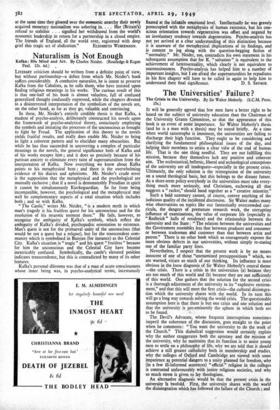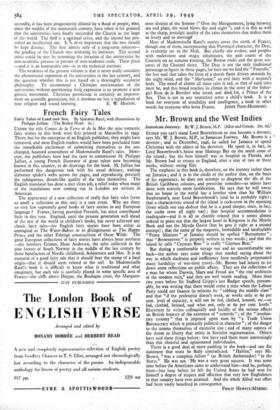The Universities' Failure ?
IT will be generally agreed that few men have a better right to be heard on the subject of university education than the Chairman of the University Grants Committee, so that the appearance of this book is an event of some importance. Sir Walter Moberly'S thesis (and he is a man with a thesis) may be stated briefly. At a time when world catastrophe is imminent, the universities are failing to discharge their high function. They ought to be considering and clarifying the fundamental philosophical issues of the day, and helping their members to attain a clear view of the end of human life. That is the one thing needful. They are not fulfilling this mission, because they themselves lack any positive and coherent aim. The ecclesiastical, hellenic, liberal and technological conceptions of the university are all inadequate—especially in the present crisis. Ultimately, the only solution is the reintegration of the university on a sound theological basis, but this belongs to the distant future. As a short-term policy everybody in the universities must take every- thing much more seriously, and Christians, eschewing all that suggests a " racket," should band together as a " creative minority."
Such a bald summary cannot, of course, convey anything of the judicious quality of the incidental discussion. Sir Walter makes many wise observations on topics like our fantastically overcrowded cur- ricula, the dangers of premature research work, the corrupting influence of examinations, the value of corporate life (especially in " Redbrick " halls of residence) and the relationship between the university and the State : " The relation between the universities and the Government resembles less that between producer and consumer or between tradesman and customer than that between artist and patron." There is no other book which so courageously exposes the more obvious defects in our universities, without simply re-stating one of the familiar party lines.
Nevertheless, I suspect that the present work is by no means innocent of one of those "unexamined presuppositions " which, we are warned, vitiate so much of our thinking. Its influence is most obvious in the loose diagnosis of Sir Walter Moberly's central theme —the crisis. There is a crisis in the universities (a) because they are too much of this world and (b) because they are not sufficiently of this world. One gathers that the solution for the second crisis is a thorough adjustment of the university to its " explosive environ- ment," and that this will meet the first crisis—the cultural disintegra- tion which the university shares with the world. In its turn this will go a long way towards solving the world crisis. The questionable assumption here is that there is but one crisis and one solution and that the university is pre-eminently the sphere in which both are to be found.
The Devil's Advocate, whose frequent interruptions sometimes imperil the coherence of the discussion, goes straight to the point when he comments : " You want the university to do the work of the Church." This diabolical suggestion would certainly explain why the author exaggerates both the apostasy and the mission of the university, why he maintains that its function is to assist young men to settle on a philosophy of life, why we are told that it should achieve a still greater catholicity both in membership and studies, why the colleges of Oxford and Cambridge are viewed with some impatience a§ potential dangers to a unity planned for freedom, why (in a few ill-informed sentences) " official " religion in the colleges is contrasted unfavourably with junior religious societies, and why so much stress is given to lay theologians.
An alternative diagnosis would be that the present crisis in the university is twofold. First, the university shares with the world the disintegration which has followed the failure of the Church ; and
secondly, it has been progressively diluted by a flood of people, who, since the middle of the nineteenth century, have taken it for granted that the universities have finally succeeded the Church as the hope of the world. The first' is a spiritual crisis, and the second has pro- voked an intellectual one. It Is most important that the two should Iv: kept distinct. The first admits only of a long-term solution— the goading of the Church into widening its horizons. The second crisis could be met by stemming the invasion of the universities by non-academic persons in pursuit of non-academic ends. Their place —and it is an honourable one—is in the technical institute.
The weakness of the present volume is that it never really considers the phenomenal expansion of the universities in the last century, and the question whether this is not based oh- a thoroughly secularist philosophy. To recommend a Christian reorientation of the universities without questioning theitexpansion is to promote a new gnostic movement. Christian gnosticism- is certainly an improve- ment on scientific gnosticism, but it involues. no less a repudiation of



































 Previous page
Previous page